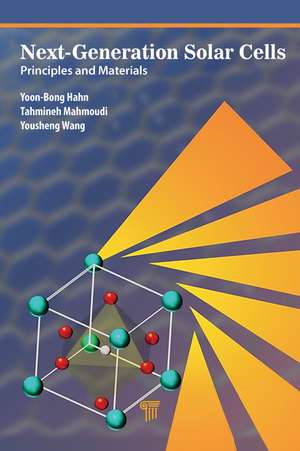Next-Generation Solar Cells: Principles and Materials
Autor Yoon-Bong Hahn, Tahmineh Mahmoudi, Yousheng Wangen Limba Engleză Hardback – 10 aug 2023
Preț: 806.69 lei
Preț vechi: 886.47 lei
-9% Nou
Puncte Express: 1210
Preț estimativ în valută:
154.38€ • 159.48$ • 128.48£
154.38€ • 159.48$ • 128.48£
Carte disponibilă
Livrare economică 05-19 martie
Livrare express 18-22 februarie pentru 38.05 lei
Preluare comenzi: 021 569.72.76
Specificații
ISBN-13: 9789814968669
ISBN-10: 9814968668
Pagini: 328
Ilustrații: 5 Tables, black and white; 50 Line drawings, color; 53 Line drawings, black and white; 3 Halftones, color; 7 Halftones, black and white; 53 Illustrations, color; 60 Illustrations, black and white
Dimensiuni: 152 x 229 x 23 mm
Greutate: 0.67 kg
Ediția:1
Editura: Jenny Stanford Publishing
Colecția Jenny Stanford Publishing
ISBN-10: 9814968668
Pagini: 328
Ilustrații: 5 Tables, black and white; 50 Line drawings, color; 53 Line drawings, black and white; 3 Halftones, color; 7 Halftones, black and white; 53 Illustrations, color; 60 Illustrations, black and white
Dimensiuni: 152 x 229 x 23 mm
Greutate: 0.67 kg
Ediția:1
Editura: Jenny Stanford Publishing
Colecția Jenny Stanford Publishing
Cuprins
1. Electromagnetic Radiation 2. Physics and Properties of Semiconductors 3. Working Principles and Limitations of Solar Cells 4. Generations of Solar Cells 5. Organic Solar Cells 6. Quantum Dot Solar Cells 7. Organic–Inorganic Hybrid Solar Cells 8. Perovskite Solar Cells 9. Structures, Transport Materials, and Deposition Methods for Perovskite Solar Cells 10. Defects and Ions Migration in Perovskite Solar Cells 11. Quantum Dots, Tandem, and Lead-Free Perovskite Solar Cells 12. Composites-Based Efficient and Stable Perovskite Solar Cells with Interface Engineering 13. Characterization of Solar Cell Materials and Devices
Recenzii
"This book is a comprehensive and authoritative guide to the latest advancements in solar cell research and related technologies. Impressively, it not only enters into all the important details determining device functionality from both a materials science and a device engineering point of view, but also offers a synthetic but clear description of the main techniques applied for full device characterization, which is essentially an important step in understanding the interdisciplinary field sufficiently. Overall, it is an unmissable volume in the library of a scientist working in the broad field of photovoltaic technologies, grounding on the past, with an open and inspired eye to the future of these essential devices."
Prof. Alberto Vomiero
Luleå University of Technology, Sweden
"This book releases at a time when the need for a sustainable energy transition is of great importance toward reaching net zero goals. While solar energy will be at the forefront of this drive, the book covers most of the materials technologies that will be key for next-generation devices to be considered. Materials, concepts, devices, and architectures, including characterization techniques are covered in detail, which should be essential reading for graduate courses and researchers in the field."
Prof. S. Ravi P. Silva
Advanced Technology Institute, University of Surrey, UK
Prof. Alberto Vomiero
Luleå University of Technology, Sweden
"This book releases at a time when the need for a sustainable energy transition is of great importance toward reaching net zero goals. While solar energy will be at the forefront of this drive, the book covers most of the materials technologies that will be key for next-generation devices to be considered. Materials, concepts, devices, and architectures, including characterization techniques are covered in detail, which should be essential reading for graduate courses and researchers in the field."
Prof. S. Ravi P. Silva
Advanced Technology Institute, University of Surrey, UK
Notă biografică
Yoon-Bong Hahn is a Regents Professor of Jeonbuk National University (JBNU), South Korea, and is a fellow of the Korea Academy of Science and Technology (KAST), American Ceramic Society (ACerS), and the International Association of Advanced Materials (IAAM). He received his PhD in metallurgical engineering from the University of Utah, USA, in 1988, after which he started working at the research center of LG Metals, Korea, until 1991 when he joined JBNU. His research focuses on the synthesis of metal and metal oxide nanostructures and their applications in solar cells, chemical and biological sensors, and printed electronics.
Tahmineh Mahmoudi is a researcher working in collaboration with the Prof. Yoon-Bong Hahn group at the Advanced nano-Materials Processing Laboratory (AMPL), School of Semiconductor and Chemical Engineering, JBNU. She received her PhD in chemical engineering from JBNU in 2015. Her research focuses on metal oxides and graphene-based materials and their applications for hybrid and perovskite solar cells.
Yousheng Wang is an associate professor at the Institute of New Energy Technology, Jinan University, China, since 2019. He received his PhD in semiconductor and chemical engineering from JBNU, where he later became a postdoctoral fellow. His research focuses on the development of hybrid perovskite composites and their applications for next-generation solar cells.
Tahmineh Mahmoudi is a researcher working in collaboration with the Prof. Yoon-Bong Hahn group at the Advanced nano-Materials Processing Laboratory (AMPL), School of Semiconductor and Chemical Engineering, JBNU. She received her PhD in chemical engineering from JBNU in 2015. Her research focuses on metal oxides and graphene-based materials and their applications for hybrid and perovskite solar cells.
Yousheng Wang is an associate professor at the Institute of New Energy Technology, Jinan University, China, since 2019. He received his PhD in semiconductor and chemical engineering from JBNU, where he later became a postdoctoral fellow. His research focuses on the development of hybrid perovskite composites and their applications for next-generation solar cells.
Descriere
This book addresses the principles and materials for the development of next-generation solar cells for a sustainable global society. It reviews the structures, working principles, and limitations of solar cells as well as the improvement methods of their power-conversion efficiency.
